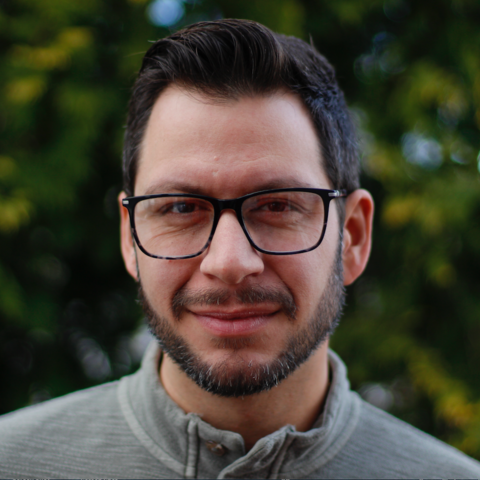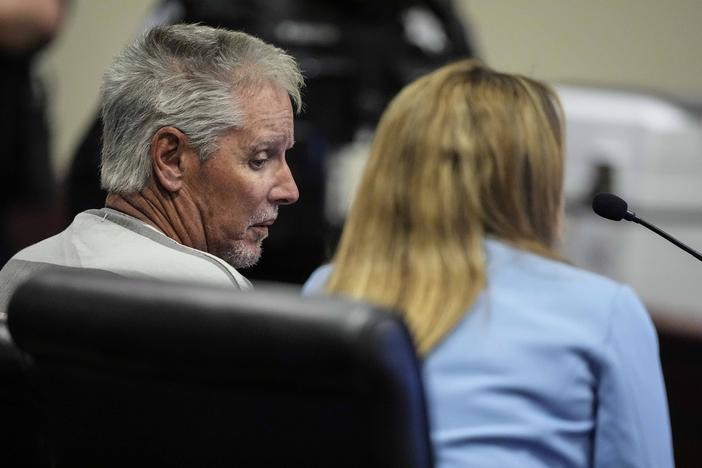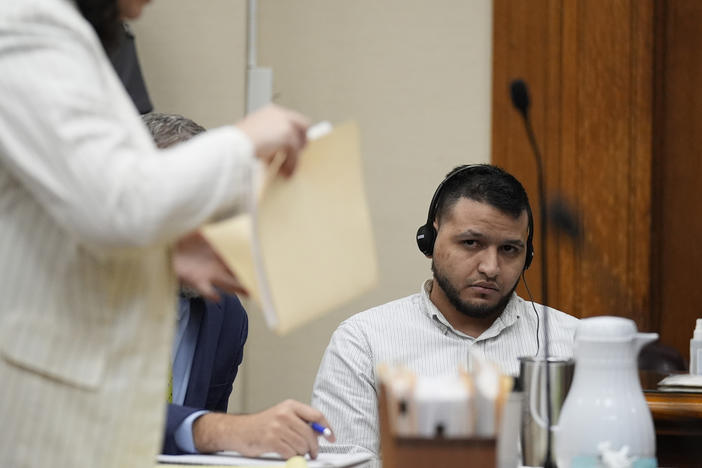
Section Branding
Header Content
Georgia Today: Memorial Day travelers; Fairburn data center; Game warden shortage
Primary Content
LISTEN: On the Tuesday, May 28 edition of Georgia Today: Memorial Day travelers came out in force; a new data center is proposed for Fairburn, southwest of Atlanta; and a shortage of game wardens has caused a back up in issuing hunting and fishing licenses.

Peter Biello: Welcome to the Georgia Today podcast from GPB News. Today is Tuesday, May 28. I'm Peter Biello. On today's episode, Memorial Day travelers came out in force. A new data center is proposed for Fairburn, southwest of Atlanta, and a shortage of game wardens has caused a backup in hunting and fishing licenses. These stories and more are coming up on this edition of Georgia Today.

Story 1:
Peter Biello: Memorial day weekend marks the beginning of a busy summer season in Atlanta's Hartsfield-Jackson International Airport. GPB's Amanda Andrews explains the world's busiest airport is already seeing record numbers.
Amanda Andrews: Crowds have returned to normal summer levels after a record-breaking 111,000 travelers were screened at Hartsfield-Jackson Thursday. It's estimated nearly 2.4 million people moved through the airport over the weekend, despite delays from storms across the country. Airport spokesman Andrew Gobeil says travel continues to be on track to reach pre-pandemic levels.
Andrew Gobeil: Remember, we broke a record back in 2019, pre-COVID, when we served 110 million passengers. We're getting close to that figure again, and there is a chance — there is a chance — that we could approach that number this year.
Amanda Andrews: Gobeil says he expects airport traffic will remain high through the Labor Day weekend before going down in the fall. For GPB News, I'm Amanda Andrews.
Story 2:
Peter Biello: Another data center is being planned for Georgia, this time in Fairburn in Fulton County, southwest of Atlanta. The proposal for Fairburn Technology Center includes nearly 1.2 million square feet of space in three buildings over nearly 60 acres. It's being developed by Bohannan Road Ventures. Data centers are large computing warehouses that store data and servers and power IT systems, and proposals for them are becoming more common in the state. In nearby Douglas County, a more than 2.2 million-square-foot data center was proposed last month by TC Atlanta Development. Gov. Brian Kemp vetoed a two-year pause earlier this month and a tax break for data centers after lobbyists fought to preserve it. Data centers like these often need lots of electricity. Power usage by data centers in Georgia more than doubled between the first and second halves of last year.
Story 3:
Peter Biello: A sheriff's deputy in Southeast Georgia has responded to a federal lawsuit filed against him by the family of Leonard Cure, a wrongfully convicted Black man from metro Atlanta who was shot and killed during a traffic stop last year just north of the Georgia-Florida border. GPB's Benjamin Payne reports.
Benjamin Payne: In a new court filing, Camden County Sheriff's Deputy Buck Aldridge denies allegations that he used excessive and deadly force against Leonard Cure after pulling him over for speeding. The police killing sparked national outrage last October, as Cure had recently been released after spending 16 years in a Florida prison for a crime he didn't commit. After the 53-year-old's death, his family filed a civil lawsuit against Aldridge, arguing he shot his Taser despite Cure complying with the deputy's order to put his hands behind his back. A fight ensued between the two, ending with Aldridge fatally shooting Cure. In a new court filing. Aldridge cites qualified immunity, a controversial legal doctrine which shields police officers from financial damages. But Aldridge admits that he was fired from his previous job as a police officer in Kingsland, Ga., for violating the department's use of force policy. Aldridge is asking a federal judge to dismiss the lawsuit. For GPB News, I'm Benjamin Payne.
Story 4:
Peter Biello: The CDC says it's making it easier for you to find the health information you're looking for. The Atlanta-based agency recently redesigned its website. Carol Crawford with the CDC says to make it easy to find the information you need, they had to remove nearly two-thirds of its content.
Carol Crawford: And we realize we had so much content, it was hard for people to find what they need. So we looked at what people were using, what might not be the best content that we had. Anything that we could consolidate or reduce duplication. So it was just — it was more streamlined experience. We kept all the important health information that people need.
Peter Biello: She says the removed content will be available at archive.CDC.gov. for six months. The newly designed site includes page summaries and content labeled by intended audience.

Story 5:
Peter Biello: If you've applied for a hunting or fishing license in Georgia, you may experience a delay. That's because the state is experiencing a shortage of game wardens. Col. Mike England, with the state Department of Natural Resources, says while the state's population has increased in the past quarter century, the number of game wardens has dropped. There are currently 234 accounted for in the DNR budget that takes effect July 1. That budget includes more than half a million dollars to hire six more wardens. But England says that won't fix the overall workforce shortage. The General Assembly passed pay raises for workers in state agencies suffering high turnover rates earlier this year, and that includes game wardens.
Story 6:
Peter Biello: State transportation officials are committing a half million dollars to build a pedestrian bridge over the Augusta Canal. GPB's Orlando Montoya reports.
Orlando Montoya: Augusta commissioners approved the plan earlier this month. The canal's executive director, Tyler Snead, says the historic waterway already has two pedestrian bridges linking to its trail. But:
Tyler Snead: Unfortunately, it's kind of just on an island by itself. You have to get in a car to get there. And one of the ideas that we have as the Augusta Canal Authority is to promote walkability.
Orlando Montoya: The bridge also would link the popular canal to a booming commercial, entertainment and residential area called Riverwatch. Snead says construction could be finished in 2025, but still-incomplete funding could push that timeline back. The project's total cost is more than $1 million, with the authority seeking private funds to fill the gap. For GPB News, I'm Orlando Montoya.
Story 7:
Peter Biello: Macon's Tubman African-American Museum celebrated its founder's 91st birthday over the weekend. Richard Kyle bought an 8,500 square foot warehouse more than 40 years ago. It became the largest museum in the Southeast dedicated to educating people about the art, history and culture of African Americans. Kyle, who is in hospice care, attended the celebration on Friday virtually.

Story 8:
Peter Biello: In Georgia, citizens are free to challenge the validity of voters' registrations. But putting together a list of challenges takes time and some investigative expertise. But now an artificial intelligence tool is being developed to compile voter challenges quickly and at scale — even, as GPB Grant Blankenship reports, when there's reason to doubt their accuracy.
Grant Blankenship: It's the first day of early voting in the May primary, and the conference room at the back of the Bibb County Board of Elections is packed, spilling into the hall to hear David Sumrall.
David Sumrall: My purpose is simply to help move us — move us toward the cleanest voter roll possible.
Grant Blankenship: Sumrall heads the local Republican Party. He has a stack of just under 800 county voter registrations — close to 1% of Bibb County voters — to challenge.
David Sumrall: My challenge today applies to three different set of voters.
Grant Blankenship: Address 48 voters whose registered addresses are P.O. boxes, 159 Mercer University students sharing the same on campus address, and 585 people he claims are double registered in two communities, all on a spreadsheet, which does not impress election board member Karen Evans Daniel.
Karen Evans Daniels: Because anybody can make a spreadsheet.
Grant Blankenship: And where, she asked Sumrall, did it come from anyway?
David Sumrall: This information was compiled from state and federal sourced data using the Eagle AI network.
Grant Blankenship: And Eagle AI or Eagle Eye, a software developed by Columbia County doctor John W. "Rick" Richards Jr. Its implied promise: If anybody can make a spreadsheet, Eagle AI can make a spreadsheet faster than anybody.
Rick Richards: We use Jason's algorithms to — to help develop some of these workspaces.
Grant Blankenship: That's Richards on a Zoom call about Eagle AI obtained by the nonprofit Investigative newsroom Documented.
Rick Richards: So, Jason, how's it going in Fulton County with your, let me say, 30,000 challenges?
Grant Blankenship: Jason, is Jason Frazier, a pioneer in Georgia voter challenge circles. His playbook is echoed by the challenges in Bibb County: Question voter addresses at post office boxes; another, nonresidential addresses; and be suspect of voter names showing up in more than one city or state. If you've ever Googled yourself and found someone with your name on the other side of the country, you see how widespread that last problem could be. But what Rick Richards has done is create software that very quickly, with a few keystrokes, cross-references threads like the local voter rolls, and the National Change of Address database, to generate challenge lists along Frazier's lines at high speed and high volume. On a more recent Zoom call, also obtained by Documented, Richards says Eagle Eye is intended for three types of people.
Rick Richards: One is the the citizen who wants to verify their state voter rolls, county voter rolls; the county who is getting 15,000 challengers on a spreadsheet and doesn't know what to do with them; and then we can also do it at the state level.
Grant Blankenship: But the state of Georgia so far doesn't want Richards' help, says Mike Passenger, spokesperson for the Georgia secretary of state's office.
Mike Hassenger: We have much, much better tools in the form of the Electronic Registration Information Center, ERIC.
Grant Blankenship: ERIC was the generally accepted tool for checking voter registrations until a few years ago, when far-right activists began discrediting it. But through ERIC, officials can see what is otherwise private information.
Mike Hassenger: We have access through ERIC, for instance, to the master death database from Social Security.
Grant Blankenship: Eagle AI just scrapes newspaper obituaries. But Eagle AI is blind to many official government sources, is a fact about which Rick Richards expressed some jealousy on Zoom.
Rick Richards: I want access to the data that ERIC gets automatically. It would make our product and other people who are working it, so much more effective if we just get the date of birth, for example. If we just get the real felon list.
Grant Blankenship: Regardless, voter challenges have to be heard. And remember who Richards says is the second target group for the software:
Rick Richards: The county who is getting 15,000 challengers on a spreadsheet and doesn't know what to do with them.
Grant Blankenship: Now imagine county boards of election using Eagle AI to vet voter challenges created by Eagle AI. Marissa Pyle of the advocacy group All Voting Is Local says that's a problem.
Marissa Pyle: It's — it's an ouroboros of disinformation at this point.
Grant Blankenship: A disinformed snake eating its own tail, which Pyle says could stoke election deniers.
Marissa Pyle: If we keep finding these programs that return faulty results that support this narrative of mass ineligibility. It then — it keeps those folks engaged. It keeps them angry about this perceived problem. And it — it fuels that fire.
Grant Blankenship: Georgia Secretary of State spokesperson Michael Hassenger says about a year ago, Richards tried to sell Eagle AI to the state, essentially claiming the software is the fire extinguisher.
Mike Hassenger: If I were trying to sell a product where you have a significant percentage of the population of voters who don't trust the election process and wanted to scare them into purchasing my product, I'd make claims like that.
Grant Blankenship: The state has not yet bought. But in Richards' native Columbia County, it's a different story. There, the County Board of Elections signed a contract with Eagle AI. But County Election Supervisor Nancy Gay says she can't yet vouch for it.
Nancy Gay: That's correct, because he ha — hasn't signed their agreement and returned it back to us yet.
Grant Blankenship: Richards hasn't signed his side of the contract, and Gay says if he ever does, she doesn't intend to use Eagle AI alone to check registrations.
Nancy Gay: Nooo. No, it's just — it would be a tool. Yeah, just another tool that we could have in our, you know, or at our disposal, I guess, to — to try and help keep a clean voter list.
Grant Blankenship: But a just-passed Georgia law, SB 189, seems tailor made to set up Eagle AI as the tool for checking registrations. For instance, SB 189 allows problems surfaced through the National Change of Address Database to be sufficient for removing a voter, giving extra validity to the "one name in two places" argument. It also eliminates using post office boxes as proof of residency for voting purposes. SB 189 goes into effect in July. Back at the Bibb County Board of Elections, board members did their own research of David Sumrall's Eagle AI-generated challenge of 585 voter registrations.
Karen Evans Daniels: Of at list, 551 of those voters are inactive, according to the secretary of state's office, because the secretary of state has access that we as regular humans do not have access to.
Grant Blankenship: As for the other challenges? Every building on the Mercer University campus shares the same single address. So the students registered there? Board says they're in the clear. The board denies David Sumrall's challenges. Afterwards, he says it's not like he didn't see the board's decision coming.
David Sumrall: Well, actually, they're able better to check the work than I am because they have access to more than I do.
Grant Blankenship: But he says he might file more challenges. And will he put his name on an Eagle AI list again?
David Sumrall: We'll see. we'll see. Maybe.
Grant Blankenship: And even if those fail, they could get people thinking and talking and doubting. John "Rick" Richards Jr. declined to be interviewed for this story. For GPB News, I'm Grant Blankenship in Macon.
Story 9:
Peter Biello: In sports, the Braves take on the Washington Nationals again tonight at home after losing last night. Max Fried takes the mound for the Braves tonight. He's got a 1.77 ERA over his last three appearances. His last outing was a complete game against the Cubs, his second this year. The Braves are currently six games behind the Philadelphia Phillies in the NL East, with about two-thirds of the season to go. And Georgia Tech sophomore Hiroshi Ty won the NCAA men's golf title yesterday. He closed with par for 71, and no one was able to catch him as he became the fourth player from Georgia Tech to win the title. Ty also helped the Yellowjackets become one of eight teams that will contend for the team title.
Peter Biello: And that is it for this edition of Georgia Today. If you want to learn more about any of these stories, visit GPB.org/news and remember to subscribe to this podcast. Do it now and we will pop up automatically in your podcast feed tomorrow. And if you've got feedback or a story idea, please do send it our way. Our email address is GeorgiaToday@GPB.org. I'm Peter Biello. Thanks for listening. We'll see you tomorrow.
---
For more on these stories and more, go to GPB.org/news






